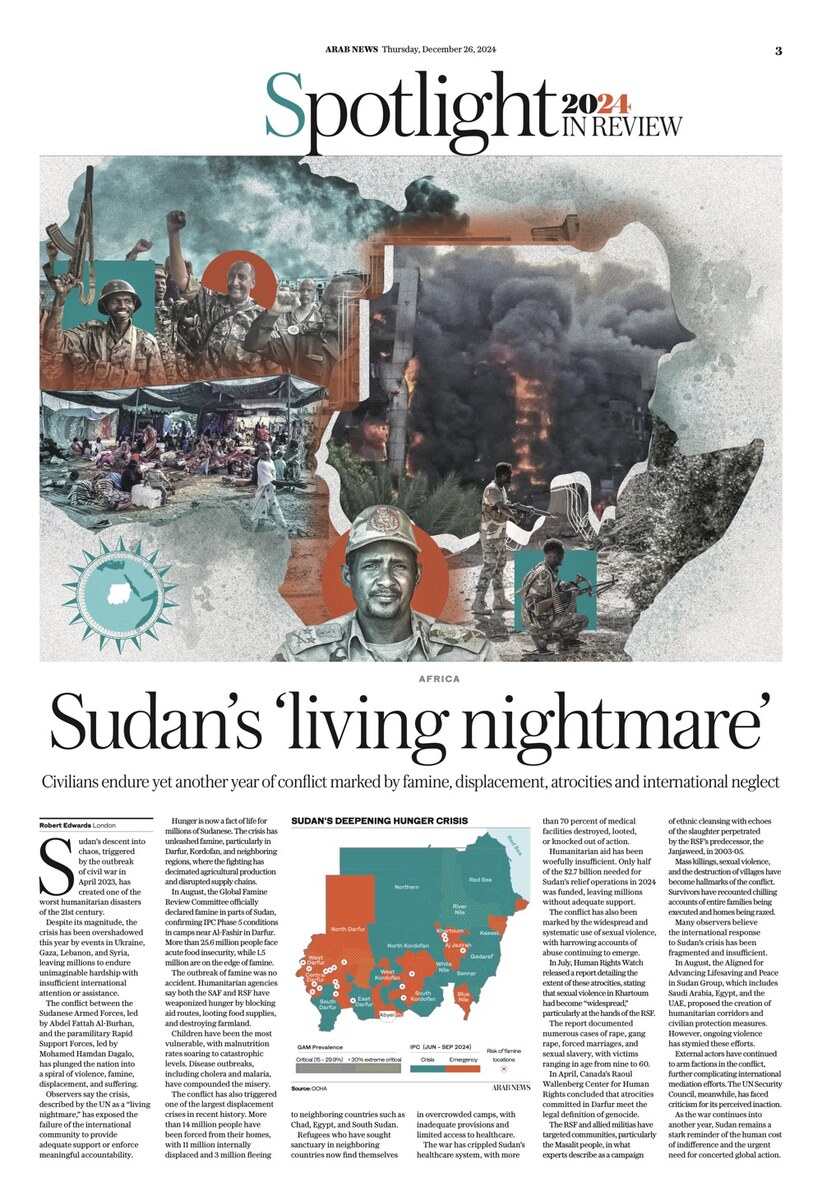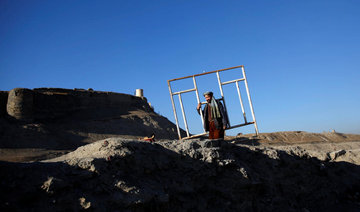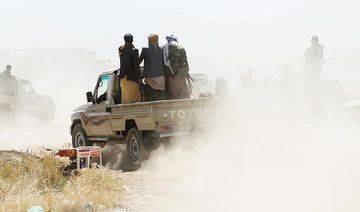BEIRUT: As President Bashar Al-Assad seeks to reassert his authority in Idlib, the only remaining province in Syria where his forces have almost no presence, he may be aided there by deep fractures within Al-Qaeda, the militant group that dominates the region.
A recent wave of detentions and a spate of violence within Al-Qaeda have also raised fears of an all-out war between insurgents in the heavily populated province near Turkey as Assad’s forces make their push.
Assad lost control of Idlib nearly three years ago and he has vowed to recapture it, but that is expected to be a bloody and costly fight. The militant haven is heavily fortified and home to thousands of fighters who transferred there from other parts of the country. It is also where tens of thousands of civilians settled after fleeing fighting in Aleppo, Homs, the suburbs of Damascus and elsewhere.
Tensions inside Idlib have been on the rise for months, reflecting a power struggle between hard-line foreign fighters loyal to Al-Qaeda’s leader, Ayman Al-Zawahri, and its more moderate Syrian members.
The tensions worsened in late November after a wave of detentions by an Al-Qaeda-linked group against more extremist, mostly non-Syrian members. Among those detained were two of Al-Qaeda’s most esteemed leaders and founding members of the extremist group’s branch in Syria, who were set free days later after pressure by factions within the group who threatened to withdraw from the battlefield in protest.
The Nov. 27 raids by the Al-Qaeda-linked Hay’at Tahrir al Sham — Arabic for Levant Liberation Committee, also known as HTS — took many by surprise and angered Al-Zawahri, who accused his top man in Syria of betrayal.
The detentions, ordered by HTS leader Abu Mohammed Al-Golani, were the clearest indication yet of the sharp divisions within the international terror network. They also come as Al-Golani appears to be edging closer to Turkey, which is trying, along with Iran and Russia, to bring an end to the country’s civil war, now in its seventh year.
HTS was until recently on the ascendant in Syria, crushing potential opponents in Idlib as its rival, the Daesh group, faced significant setbacks, losing most of the territory it once held in the country.
Those who were detained included Jordanian citizens Sami Oraidi, Al-Qaeda’s former top religious figure in Syria, and the highly secretive former military commander in southern Syria, Ayad Toubasi, also known as Abu Julaybib Al-Urduni, brother-in-law of the late Al-Qaeda in Iraq leader, Abu Musab Al-Zarqawi.
After their detentions, other Al-Qaeda officials, including a prominent cleric, went to ask Al-Golani why their comrades were detained. But the men ended up being taken into custody themselves.
“The campaign of arrests against our brothers and cadres will not stop us from continuing our struggle against the enemies of God and will open for you a door that you will wish you never opened,” a Syria-based Al-Qaeda commander, Abu Humam Al-Shami, who is opposed to HTS, warned earlier this month.
Days after Al-Shami’s warning, intense clashes broke out between HTS and the Jund Al-Malahem faction that split from it in October and is close to the detained Al-Qaeda officials, leaving at least seven people dead.
“There are widespread concerns of a full-blown confrontation between the two sides,” said an opposition activist in northern Syria who lives in areas controlled by HTS. Speaking by telephone, he asked that his name not be made public for fear of reprisals by the militants.
The activist said that dozens of other members and commanders, including one known as Abu Khadija who used to run Al-Qaeda’s notorious Al-Iqab prison, were also detained.
“It is clear that the jihadist movement in Syria is suffering probably the worst moment of internal fighting since the 2013 schism between ISIS and Jabhat Al-Nusra,” said Jennifer Cafarella of the Washington-based Institute for the Study of War, using an alternate acronym for the Daesh group. Jabhat Al-Nusra or the Nusra Front was the predecessor of HTS before it changed its name.
Oraidi and Toubasi were released after pressure by two of HTS’s most powerful armed wings, which were on the verge of withdrawing from the fight against Assad’s forces if the two were not released, according to Assem Zeidan of the Turkey-based Jabhat Al-Nusra Violations group that traces Al-Qaeda’s atrocities in Syria.
HTS said in a statement that the detainees, whom it did not identify, have “ruined the foundations” of the organization it said was dedicated to “setting up a Sunni entity that gathers all the powers of the people of the Levant to fight the enemy and represent the people of Syria.” It did not say what their offenses were.
The detentions angered Al-Zawahri, who released an audio recording in which he accused HTS and Al-Golani of “betraying the vow of allegiance,” adding that Al-Golani’s decision to break ties with Al-Qaeda last year had weakened the international terror network.
The move, in which Syria’ Al-Qaeda branch, known at the time as the Nusra Front, cut all ties with the international terror network, was seen by many as an attempt to improve its image. Months later, it formed and led a coalition consisting of several militant groups that became known as HTS, and crushed most rival groups in areas it controlled.
Ahmad Hamade, a Syrian army colonel who defected early in the conflict, said that HTS is more tolerated in northern Syria, where Al-Qaeda’s more extremist factions are usually not welcomed. In fact, many HTS fighters were members of the Free Syrian Army, the mainstream rebels fighting to topple Assad, he said.
Cafarella said that what happened over the past year with Al-Qaeda in Syria was that Al-Golani, “a forward-leaning, visionary subordinate, told his skeptical boss (al-Zawahri) to just trust him and let him implement his vision for the good of the organization.”
“The subordinate failed to generate the promised outcome in acceptable time, however. The skeptical boss therefore reclaimed control,” said Cafarella who closely follows extremist groups in the Middle East.
For months, Al-Qaeda’s branch in Syria has been witnessing rivalry between its mostly Syrian, relatively moderate members and the foreign fighters who remain loyal to Al-Zawahri. The tension became more apparent after Turkey started sending troops into areas held by HTS in northern Syria in October, with some HTS members supporting Ankara’s incursion and foreign fighters calling against it.
Asad Kanjo, an opposition activist from Idlib who currently lives in Britain, said that the divisions within Al-Qaeda’s branch in Syria are the result of Al-Golani trying to market himself as a Syrian leader who has no links to the international terror network.
“This is a purely Turkish move. Turkey wants the Syrian branch (HTS) to cut all links with the international organization,” Kanjo said, paving the way for Al-Golani to join the political process.
Hassan Hassan of the Tahrir Institute for Middle East Policy wrote recently that HTS seeks to establish ties with countries like Turkey in an attempt to become part of the solution.
“This will further push away hard-line jihadis and Al-Qaeda loyalists who have to make a decision about their fate in a country that is increasingly divided into spheres of influence of foreign countries,” he wrote.
Al-Qaeda divisions may aid Assad as he eyes Syria’s Idlib
Al-Qaeda divisions may aid Assad as he eyes Syria’s Idlib
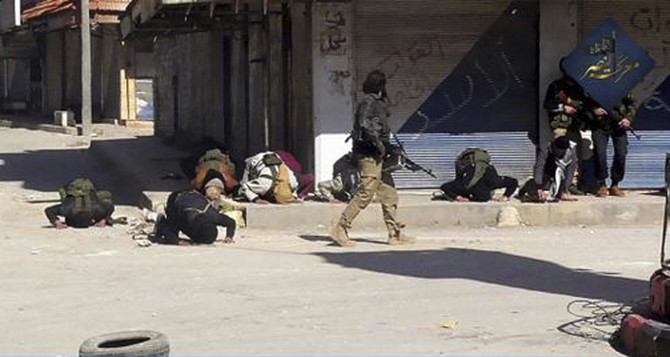
At least 10 killed in Israeli strikes on Gaza, medics say

At least 10 people were killed and more than a dozen wounded in Israeli strikes on Gaza early on Thursday, medics with the Gaza health authorities said.
Five people were killed and 20 wounded in an Israeli airstrike on a house in Gaza City’s Zeitoun neighborhood, the medics reported. They warned the death toll could rise as many remained trapped under the rubble.
In a separate incident, five journalists were killed when their vehicle was struck in the vicinity of Al-Awda hospital in Nuseirat in central Gaza, the enclave’s health authorities said. The journalists worked for the Al-Quds Al-Youm television channel.
Palestinian media and local reporters said the vehicle was marked as a media van and was used by journalists to report from inside the hospital and Nuseirat camp.
There was no immediate Israeli comment on the reported strikes.
On Wednesday, Palestinian militant group Hamas and Israel traded blame over their failure to conclude a ceasefire agreement despite progress reported by both sides in past days.
Clashes between Islamists now in power in Syria and Assad’s supporters kill 6 fighters

- Syria’s transition has been surprisingly smooth but it’s only been a few weeks since Assad fled the country and his administration and forces melted away
DAMASCUS, Syria: Clashes between Islamists who took over Syria and supporters of ousted President Bashar Assad’s government killed six Islamic fighters on Wednesday and wounded others, according to a British-based war monitor.
The Syrian Observatory for Human Rights said the fighters were killed while trying to arrest a former official in Assad’s government, accused of issuing execution orders and arbitrary rulings against thousands of prisoners. The fighters were from Hayat Tahrir Al-Sham, or HTS, which led the stunning offensive that toppled Assad earlier this month.
Syria’s transition has been surprisingly smooth but it’s only been a few weeks since Assad fled the country and his administration and forces melted away. The insurgents who ousted Assad are rooted in fundamentalist Islamist ideology, and though they have vowed to create a pluralist system, it isn’t clear how or whether they plan to share power.
Since Assad’s fall, dozens of Syrians have been killed in acts of revenge, according to activists and monitors, the vast majority of them from the minority Alawite community, an offshoot of Shiite Islam that Assad belongs to.
In the capital, Damascus, Alawite protesters scuffled with Sunni counter-protesters and gunshots were heard. The Associated Press could not confirm details of the shooting.
Alawite protests also took place along the coast of Syria, in the city of Homs and the Hama countryside. Some called for the release of soldiers from the former Syrian army now imprisoned by the HTS. At least one protester was killed and five were wounded in Homs by HTS forces suppressing the demonstration, said the Syrian Observatory. In response to the protests, HTS imposed a curfew from 6 p.m. until 8am.
The Alawite protests were apparently in part sparked by an online video showing the burning of an Alawite shrine. The interim authorities insisted the video was old and not a recent incident.
Sectarian violence has erupted in bursts since Assad’s ouster but nothing close to the level feared after nearly 14 years of civil war that killed an estimated half-million people. The war fractured Syria, creating millions of refugees and displacing tens of thousands throughout the country.
This week, some Syrians who were forcibly displaced, started trickling home, trying to rebuild their lives. Shocked by the devastation, many found that little remains of their houses.
In the northwestern Idlib region, residents were repairing shops and sealing damaged windows on Tuesday, trying to bring back a sense of normalcy.
The city of Idlib and much of the surrounding province has for years been under control of the HTS, led by Ahmad Al-Sharaa, formerly known as Abu Mohammed Al-Golani, once aligned with Al-Qaeda, but has been the scene of relentless attacks by the government forces.
Hajjah Zakia Daemessaid, who was forcibly displaced during the war, said coming back to her house in the Idlib countryside was bitter-sweet.
“My husband and I spent 43 years of hard work saving money to build our home, only to find that all of it has gone to waste,” said the 62-year-old.
In the dusty neighborhoods, cars drove by with luggage strapped on top. People stood idly on the streets or sat in empty coffee shops.
In Damascus, Syria’s new authorities raided warehouses on Wednesday, confiscating drugs such as Captagon and cannabis, used by Assad’s forces. A million Captagon pills and hundreds of kilograms (pounds) of cannabis were set ablaze, the interim authorities said.
Turkiye warns Kurdish militia in Syria ‘will be buried’ if they do not lay down arms

- Following Assad’s departure, Ankara has repeatedly insisted that the Kurdish YPG militia must disband, asserting that the group has no place in Syria’s future
ANKARA: Turkish President Tayyip Erdogan said on Wednesday that Kurdish militants in Syria will either lay down their weapons or “be buried,” amid hostilities between Turkiye-backed Syrian fighters and the militants since the fall of Bashar Assad this month.
Following Assad’s departure, Ankara has repeatedly insisted that the Kurdish YPG militia must disband, asserting that the group has no place in Syria’s future. The change in Syria’s leadership has left the country’s main Kurdish factions on the back foot.
“The separatist murderers will either bid farewell to their weapons, or they will be buried in Syrian lands along with their weapons,” Erdogan told lawmakers from his ruling AK Party in parliament.
“We will eradicate the terrorist organization that is trying to weave a wall of blood between us and our Kurdish siblings,” he added.
Turkiye views the Kurdish YPG militia — the main component of the US-allied Syrian Democratic Forces — as an extension of the outlawed Kurdistan Workers Party militia, known as the PKK, which has waged an insurgency against the Turkish state since 1984.
The PKK is designated a terrorist organization by Turkiye, the US and the European Union. Ankara has repeatedly called on its NATO ally Washington and others to stop supporting the YPG.
Earlier, Turkiye’s Defense Ministry said the armed forces had killed 21 YPG-PKK militants in northern Syria and Iraq.
Israeli airstrike in Bekaa shakes ceasefire 29 days after it came into effect

- The Israeli army claimed that “an Israeli fighter jet attacked a terrorist cell in the Bekaa”
BEIRUT: For the first time since the ceasefire between Israel and Hezbollah came into effect on Nov. 27, Israel breached the agreement deep inside Lebanese territory.
In the early hours of Wednesday, an Israeli warplane struck the town of Taraya near Baalbek.
A Lebanese security source said the airstrike occurred at 2:45 a.m., targeting a residence and an associated garage in the town of Taraya owned by a member of the Hamieh family. There were no casualties.
The Israeli army claimed that “an Israeli fighter jet attacked a terrorist cell in the Bekaa.”
Taraya is on the eastern slopes of the western Lebanese mountains, approximately 73 kilometers from the capital city of Beirut and 23 kilometers from the city of Baalbek. It was previously targeted by Israeli airstrikes during the extensive war on Lebanon — which lasted for 64 days — under the pretext of targeting sites and weapon depots belonging to Hezbollah.
Israel’s continued flouting of the terms of the ceasefire, which has been in effect for 29 days, were the focal point of a meeting held on Tuesday evening between caretaker Prime Minister Najib Mikati and representatives from the United States, France, and the UN Interim Force in Lebanon.
The attendees included American Maj. Gen. Jasper Jeffers, France’s Gen. Guillaume Ponchin, the commander of the Southern Litani sector of the Lebanese Army, Brig. Gen. Edgar Lowndes, and UNIFIL Commander Maj. Gen. Aroldo Lazaro, along with the Lebanese army commander, Brig. Gen. Joseph Aoun.
Mikati called on the committee to “stop the Israeli violations and the immediate withdrawal of Israeli forces from the border areas.”
He also agreed with the attendees to hold successive meetings with the Lebanese army to discuss the issues raised.
Israeli reconnaissance planes resumed incursions into Lebanese airspace, flying at low altitude over southern Lebanon, Beirut and its southern suburbs, after ceasing operations for two days.
On Wednesday, the Israeli army raised Israeli flags at a vacant Lebanese army post on Awida Hill.
This site, a strategic location, is where the Lebanese army previously established a base. It is adjacent to the villages of Kfar Kila, Adaisseh, Deir Mimas and Taybeh and overlooks Israeli settlements in Galilee, including Kiryat Shmona and Hula Valley, extending to Tiberias and deep into the Golan Heights.
Israeli raids on the border village of Taybeh killed two people on Monday.
The Israeli forces that invaded several border villages in southern Lebanon demolished houses and bulldozed roads on the outskirts of Houla, adjacent to Mays Al-Jabal. Lebanese residents are still denied entry to the occupied area, which includes 62 villages.
Israeli artillery shelling on Wednesday targeted Tayr Harfa, the outskirts of Majdal Zoun, and Maroun Al-Ras. Israeli forces also struck Jebbayn, firing bursts of machine-gun fire toward the town.
Media reports in Beirut reported that “US envoy Amos Hochstein will visit Beirut at the beginning of next year to help implement the ceasefire agreement in Lebanon.”
Israeli forces have dragged their heels in the withdrawal from invaded border areas, delaying the Lebanese army’s deployment in the cleared area.
Fears grow that Israeli’s war against Lebanon may restart, because the committee overseeing the implementation of the ceasefire is unable to stop Israeli violations.
The Israeli army is using the 60-day period in the ceasefire agreement for the complete withdrawal of its troops from invaded areas to destroy what is left of Hezbollah’s positions and weapon depots.
Meanwhile, explosions were heard in the Anti-Lebanon mountains separating Lebanon and Syria, apparently caused by the Lebanese army detonating explosive remnants of Israeli operations against Bekaa.
2024 Year in Review: Conflict keeps Sudanese trapped in a nightmare without end

- Famine now blights swathes of the country, while mass atrocities have taken place in Darfur and other regions
- Sudan remains a stark reminder of the human cost of indifference and the urgent need for concerted global action
LONDON: Sudan’s descent into chaos, triggered by the outbreak of civil war in April 2023, has created one of the worst humanitarian disasters of the 21st century.
Despite its magnitude, the crisis has been overshadowed this year by events in Ukraine, Gaza, Lebanon, and Syria, leaving millions to endure unimaginable hardship with insufficient international attention or assistance.
The conflict between the Sudanese Armed Forces, led by Abdel Fattah Al-Burhan, and the paramilitary Rapid Support Forces, led by Mohamed Hamdan Dagalo, has plunged the nation into a spiral of violence, famine, displacement, and suffering.
Over the course of 2024, tens of thousands of people have been killed and millions forced from their homes. Famine now blights swathes of the country, while mass atrocities have taken place in Darfur and other regions.
Essential services, including hospitals, have collapsed, leaving the population dependent on overstretched and underfunded humanitarian aid.
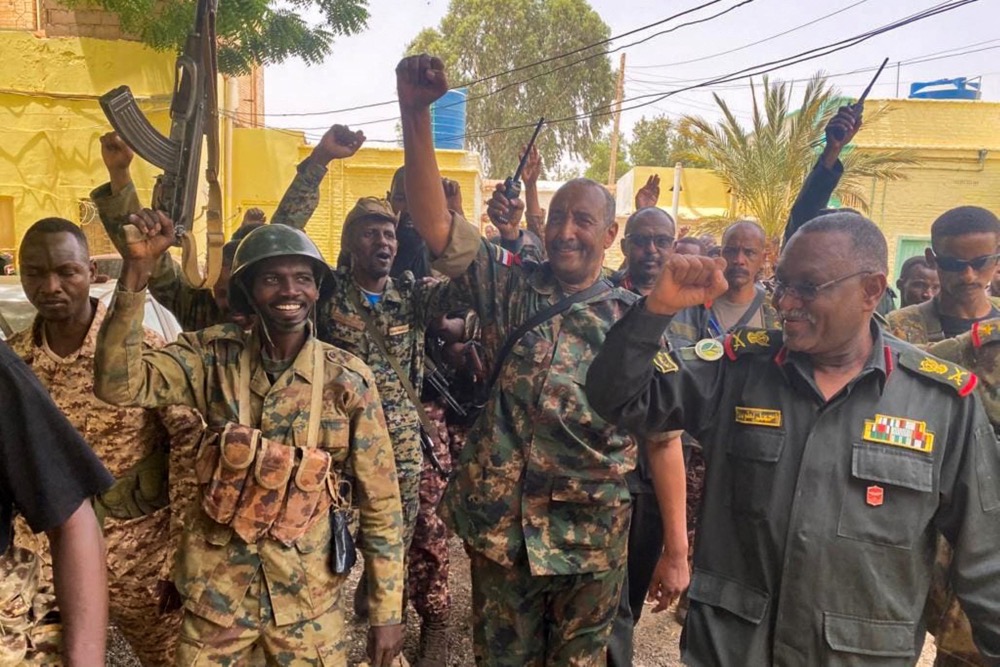
Observers say the crisis, described by the UN as a “living nightmare,” has exposed the failure of the international community to provide adequate support or enforce meaningful accountability.
Hunger is now a fact of life for millions of Sudanese. The crisis has unleashed famine, particularly in Darfur, Kordofan, and neighboring regions, where the fighting has decimated agricultural production and disrupted supply chains.
In August, the Global Famine Review Committee officially declared famine in parts of Sudan, confirming IPC Phase 5 conditions in camps near Al-Fashir in Darfur. More than 25.6 million people face acute food insecurity, while 1.5 million are on the edge of famine.
The outbreak of famine was no accident. Humanitarian agencies say both the SAF and RSF have weaponized hunger by blocking aid routes, looting food supplies, and destroying farmland.
The deliberate targeting of humanitarian convoys has left isolated communities without access to food or clean water, exacerbating the crisis. Children have been the most vulnerable, with malnutrition rates soaring to catastrophic levels in displacement camps.
Malnutrition weakens immune systems, making the population more susceptible to illness. Disease outbreaks, including cholera and malaria, have compounded the misery.
Relief efforts, hampered by funding gaps and logistical challenges, have failed to match the scale of need. Despite repeated warnings from aid organizations, donor pledges have fallen short, leaving millions at risk of starvation.

The conflict has also triggered one of the largest displacement crises in recent history. More than 14 million people have been forced from their homes, with 11 million internally displaced and 3 million fleeing to neighboring countries such as Chad, Egypt, and South Sudan.
Khartoum, once the vibrant capital of Sudan, has become an epicenter of displacement. Entire neighborhoods lie in ruins, and millions of internally displaced persons now live in makeshift shelters, enduring appalling conditions.
Refugees who have sought sanctuary in neighboring countries now find themselves in overcrowded camps, with inadequate provisions and limited access to healthcare.
Host countries, already grappling with their own economic and security challenges, have received insufficient international support to meet the growing needs of these vulnerable populations.
The plight of IDPs is compounded by continued violence. Armed groups frequently attack camps, looting supplies and preying on displaced families. Meanwhile, humanitarian organizations face immense challenges in reaching those most in need.
Millions of people lack access to basic necessities such as food, water, medicine, and fuel. The war has crippled the country’s healthcare system, with more than 70 percent of medical facilities destroyed, looted, or knocked out of action.
Humanitarian aid, though vital, has been woefully insufficient. Only half of the $2.7 billion needed for Sudan’s relief operations in 2024 was funded, leaving millions without adequate support.

Aid agencies say the SAF and RSF have systematically obstructed deliveries of relief, targeting warehouses and convoys in an attempt to starve opposition strongholds into submission. As such, despite the efforts of aid workers, the scale of suffering continues to grow.
The toll of Sudan’s civil war is staggering, with estimates indicating more than 150,000 civilians killed since the conflict began in April 2023. These deaths, caused by bombardments, massacres, starvation, and disease, underscore the catastrophic human cost of the war.
A November report by the London School of Hygiene & Tropical Medicine estimated more than 61,000 deaths in Khartoum state alone between April 2023 and June 2024.
Medical professionals warned early on that official figures underrepresented the true death toll, as many victims could not access hospitals due to ongoing violence.
In a May US Senate hearing, experts suggested the real casualty figure could be 10 to 15 times higher than earlier estimates.
The appalling extent of the violence plaguing Sudan emerged in October and November amid a spate of massacres in eastern Al-Jazirah state. As of December, up to 7,000 civilians had been killed in a series of brutal attacks reportedly carried out by the RSF, according to local monitors.
Survivors recounted harrowing tales of mass rape, forced displacements, and homes set ablaze. These atrocities are part of a broader pattern of violence that has characterized the conflict across Sudan.
Ethnic and territorial motives have driven these attacks, particularly in non-Arab communities. The RSF has been accused of systematic killings, sexual violence, and the destruction of entire villages in Darfur and other regions.
International condemnation of the massacres has been swift but largely ineffective. Human rights organizations have called for accountability and protection for civilians, but the lack of a functional justice system in Sudan has allowed perpetrators to act with impunity.
The conflict has also been marked by the widespread and systematic use of sexual violence, with harrowing accounts of abuse continuing to emerge.

In July, Human Rights Watch released a report detailing the extent of these atrocities, stating that sexual violence in Khartoum had become “widespread,” particularly at the hands of the RSF.
The report documented numerous cases of rape, gang rape, forced marriages, and sexual slavery, with victims ranging in age from nine to 60.
Women and girls, often displaced and vulnerable, have been subjected to unimaginable suffering. NGOs estimate that as many as 4,400 cases of sexual assault may have occurred during the conflict, though the true number is likely much higher.
In April, Canada’s Raoul Wallenberg Center for Human Rights concluded that atrocities committed in Darfur meet the legal definition of genocide.
The RSF and allied militias have targeted communities, particularly the Masalit people, in what experts describe as a campaign of ethnic cleansing with echoes of the slaughter perpetrated by the RSF’s predecessor, the Janjaweed, in 2003-05.
Mass killings, sexual violence, and the destruction of villages have become hallmarks of the conflict. Survivors have recounted chilling accounts of entire families being executed and homes being razed.
The international community has struggled to respond effectively. While some advocacy groups have called for stronger sanctions and international prosecutions, enforcement mechanisms remain weak.
Many observers believe the international response to Sudan’s crisis has been fragmented and insufficient.

The EU imposed sanctions on individuals and entities linked to activities that undermine Sudan’s stability, including those implicated in atrocities. However, these measures have done little to change the behavior of the warring factions.
The US and the African Union have called for a ceasefire, while Saudi Arabia and others have sought to mediate between the parties. However, peace talks have repeatedly failed.
In August, the Aligned for Advancing Lifesaving and Peace in Sudan (ALPS) Group, which includes Saudi Arabia, Egypt, and the UAE, proposed the creation of humanitarian corridors and civilian protection measures. However, ongoing violence has stymied these efforts.
External actors have continued to arm factions in the conflict, further complicating international mediation efforts. The UN Security Council, meanwhile, has faced criticism for its perceived inaction.
As the war continues into another year, Sudan remains a stark reminder of the human cost of indifference and the urgent need for concerted global action.
